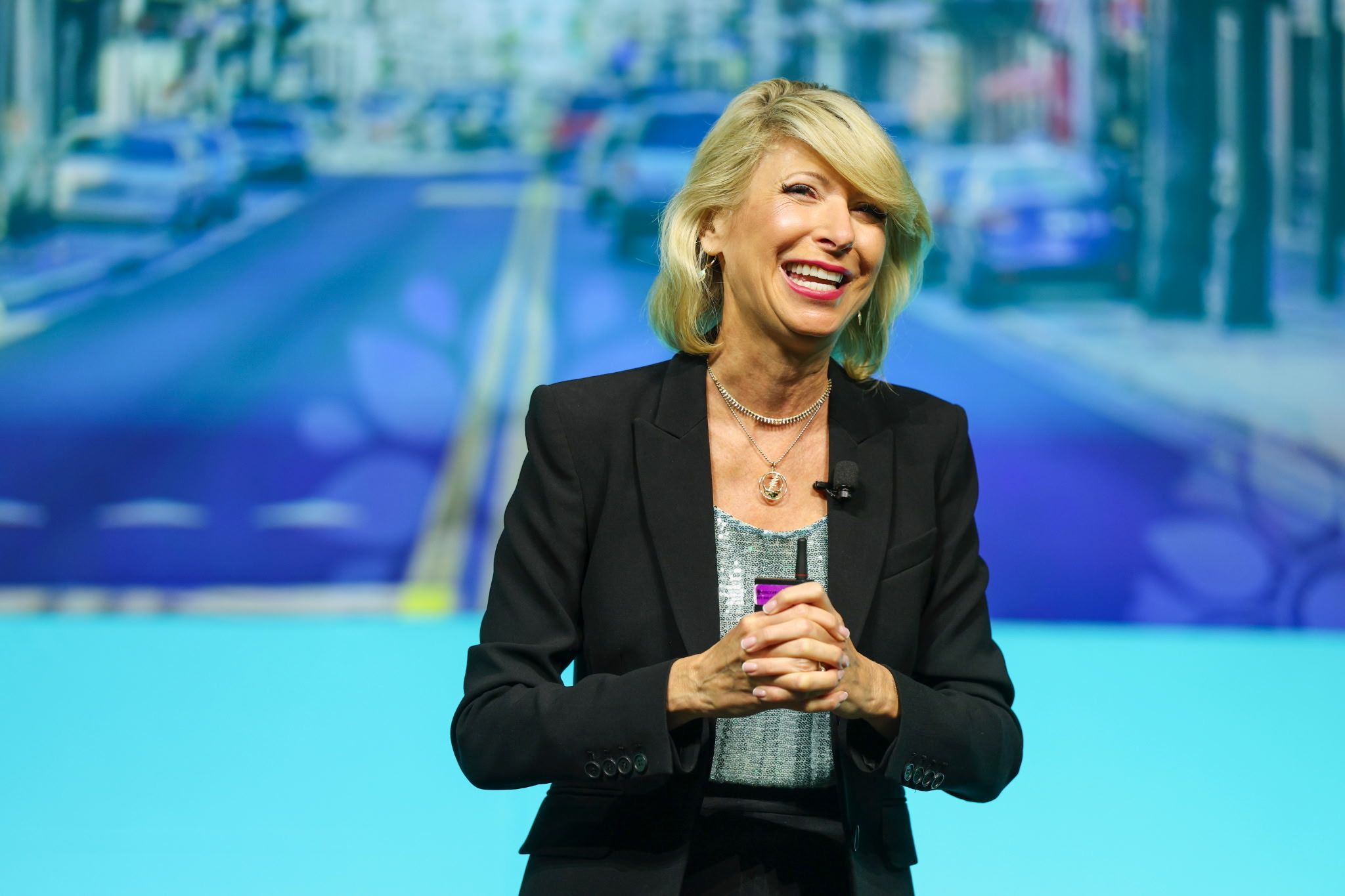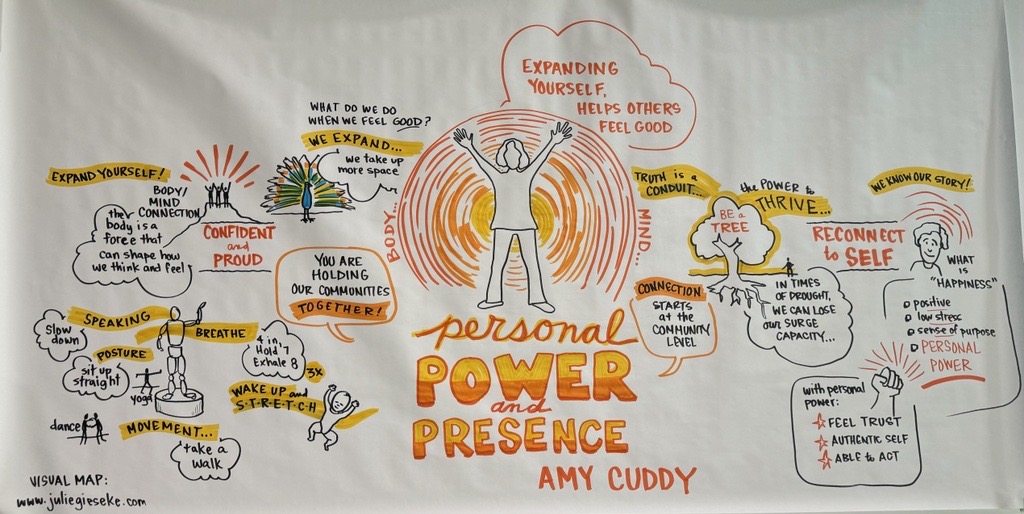
When Dr. Amy Cuddy took the stage at the 2025 ICMA Annual Conference for the Monday general session sponsored by Prophecy Gov, she began not with slides or data, but with gratitude. “I know you’re the people holding our communities together,” she told the crowd of city and county leaders. “You weather storms. You protect people. And I see you.” It set the tone for an hour that was equal parts science, storytelling, and soul—a powerful reminder that leadership begins with presence, not position.
Cuddy, a social psychologist, award-winning Harvard lecturer, and author of the best-selling book Presence: Bringing Your Boldest Self to Your Biggest Challenges, explored how individuals can access their “personal power”—the ability to bring one’s authentic, capable self to high-pressure moments—and why that matters more than ever for public servants facing division, burnout, and constant change.
Reclaiming Connection and Optimism
Cuddy acknowledged the challenges of leading in an era of deep polarization. She shared that her upcoming book examines “the psychology of adult bullying, bystander behavior, and bravery.” Yet, despite years of research into divisive behavior, she said she feels more optimistic than ever.
“I’m surprised to hear myself say this,” she admitted, “but I think we are ready for connection again. And it starts at the community level.” That optimism resonated deeply in a room filled with local government professionals, those people tasked daily with finding common ground amid conflict.
Cuddy’s message was a clear one: connection and courage are intertwined. Leaders can’t inspire or influence others from a place of fear. To lead boldly, they must first learn to feel safe and grounded themselves.
Trees and People: Expanding and Contracting Wisely
Driving home the importance of safety, grounding, and growth, Cuddy used a vivid metaphor that each person should think of themselves as a tree. When conditions are good, the tree expands: its canopy stretches, offering shade and shelter to other forms of life. But in harsh conditions, the tree contracts to survive. That contraction, she noted, is adaptive in the short term—it protects. Yet, if it lasts too long, the tree becomes brittle and its strength and vitality fade. Much like trees, people can not stay in survival mode forever.
“So many of us have been in survival mode for too long,” she stressed. “We’ve lost that surge capacity—the ability to thrive after the crisis has passed.” Her challenge to attendees: find ways to replenish your internal resources so you can expand again. Because thriving leaders create thriving communities.
Understanding Personal Power
Breaking out of survival mode and contraction means harnessing one's own personal power. Cuddy explained, first by making the important distinction between personal power and the more often thought of, formal power.
Formal power is control over others—authority, hierarchy, resources. It’s finite and zero-sum.
Personal power is internal. It’s the ability to regulate one’s own emotions, behaviors, and responses. It’s infinite and contagious.
“When we feel personally powerful,” she explained, “our behavioral approach system is activated. We see challenges as opportunities. We trust more. We collaborate. We feel abundance.”
Conversely, when we feel powerless, our inhibition system takes over. “We brace. We withdraw. We see scarcity — someone else’s win feels like our loss.” This cycle shapes not only our well-being but also our ability to lead, connect, and act courageously on behalf of others.
To sum it up and bring it back to the tree metaphor, personal power equals expansion, while powerlessness equals contraction.

Presence, Trust and Authentic Leadership
The next critical element in Cuddy's framework is presence. Cuddy shared that presence is not about performance or charisma. It’s about alignment between how we feel, what we value, and how we show up. “When we are courageous enough to really show up—to be present—people believe us because we believe ourselves,” she urged.
For leaders, this authenticity builds the foundation of trust. “Trust is the conduit of influence,” she explained. “It doesn’t matter how great your ideas are. If people don’t feel seen or safe, they won’t hear them.”
Cuddy encouraged attendees to prioritize trust before confidence. “Many people try to appear strong before they show they’re trustworthy,” she said. “But it actually works the other way.”
The Body-Mind Feedback Loop
A hallmark of Cuddy’s work and the key to harnessing one's own personal power is the science of embodiment — how our physical posture, breath, and movement shape our psychological state. “We often think of the mind telling the body what to do,” she said. “But our bodies are constantly sending information back to our brains about how to think and feel.”
This feedback loop means we can use simple, intentional physical practices to shift our mental and emotional state. Cuddy led attendees through several examples, grounding the concepts in research:
1. Breathing
When we feel powerless, our breathing becomes shallow and rapid. To regain calm and confidence, she recommended the “4-7-8” method: inhale for four counts, hold for seven, and exhale for eight. “It’s so simple,” she said, “but it tells your nervous system you’re safe.”
2. Speaking
The pace of speech affects perceived and felt power. “When we speak slowly, we take up temporal space,” Cuddy noted. Research shows slower speakers are seen as—and feel—more confident. “Even pausing is powerful,” she said. “Silence signals control.”
3. Simple and Complex Posture
Sitting or standing upright affects mood and recall. In one study, depressed participants who sat up straight for two minutes scored lower on depression scales than those who slouched. “We often teach kids to sit up straight to show respect for others,” Cuddy said. “But we should also teach them that it’s a sign of self-respect.”
4. Movement
Movement, even walking, has measurable psychological effects. People who walk with long strides and open shoulders feel happier and more confident than those who shuffle or hunch. “Take a walk before you open your inbox,” she advised. “Start your day with power, not reactivity.”
The Science of Expansion
Across species, Cuddy noted, confidence and personal power manifests as expansion. “When animals feel powerful, they take up more space—they stand tall, raise their ears, puff their chests. Humans do the same.”
Her research shows that even people blind from birth instinctively expand in victory, proving that these postures are hardwired, not learned. Expansion, both physically and emotionally, signals safety to the brain. Contraction signals threat.
“Think of Usain Bolt crossing the finish line,” she said. “That open, victorious posture tells your brain: I’m safe. I belong. I can act.”
Expansive postures, even when practiced privately before stressful events, improve performance and presence. In one study, participants who spent two minutes in expansive poses before a mock job interview were rated more confident and authentic—and felt better themselves—than those who had slouched and sat in contractive poses prior to their mock interviews.
Her advice came with a caveat: “Do it before you walk into the room,” she laughed. “Don’t power pose during the interview. That never goes well.”
Small Shifts, Big Impact
Cuddy emphasized that personal power isn’t about grand gestures.
“It’s not about pretending to be powerful, it’s about reminding your body and mind that you already are.”
From yoga poses to deep breathing to taking long strides, these micro-practices help leaders access composure and clarity in moments that matter most. Over time, they help shift from survival mode back into a thriving, creative stat—from contraction to expansion.
She also touched on the importance of joy and movement. Sharing her own love of roller-skate dancing, she described how synchronized movement, whether in dance or sports, enhances mood and connection. “Even watching people move together calms our nervous systems,” she said. “We are wired to connect.”
The Lesson of the Horse
Cuddy closed with a story from an email she once received from a horse trainer who had applied her research. The trainer worked with an Icelandic pony who had become withdrawn after an injury. Feeling inspired by Cuddy's research, she encouraged him to mimic dominant, “powerful” movements again—rearing, pouncing, expanding. Within weeks, the pony began to reengage and ultimately became the most confident horse in his herd.
“We are not horses,” Cuddy said with a smile after sharing this touching story. “But we are animals. Our nervous systems work in the same way.”
Be the Tree
Returning to her opening metaphor, Cuddy left the audience with a final image: “You are the tree,” she said. “Allow yourself to expand. Because when you expand, you don’t just do it for yourself, you do it for your communities.”
In an era where leaders often face impossible pressures and relentless scrutiny, Cuddy’s message was both practical and profound: Presence is power, power is contagious, and the courage to show up—authentically and expansively—is what helps communities and and individuals grow strong again.
Watch ICMA TV to see more from the 2025 ICMA Annual Conference!
New, Reduced Membership Dues
A new, reduced dues rate is available for CAOs/ACAOs, along with additional discounts for those in smaller communities, has been implemented. Learn more and be sure to join or renew today!
